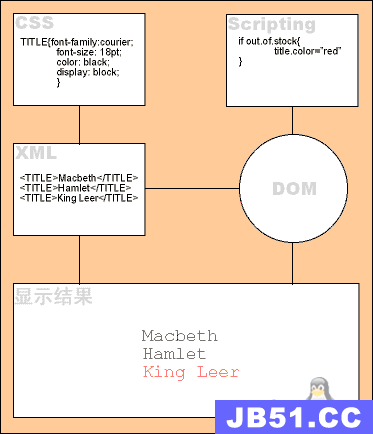>我想去槽xml文档,所有的节点
>检查节点是否存在属性
如果节点没有属性,情况下,获取/生成其xpath值的字符串
如果节点具有属性,则迭代通过属性列表,并为包括节点的每个属性创建xpath。
建议?希望你会提供一些有用的英特尔
编辑:
这样做的原因是..我在jmeter中编写自动化测试,所以对于每个请求,我需要验证该请求实际上做了它的工作,所以我断言结果通过获取节点值与xpath。(额外信息 – 不相关)
当请求是小的,它没有问题,创建断言,手,但对于较大的,它的一个真正的痛苦..(额外的信息 – 不相关)
BOUNTY:
我在寻找java的方法
目标
我的目标是从这个ex xml文件实现以下:
<root>
<elemA>one</elemA>
<elemA attribute1='first' attribute2='second'>two</elemA>
<elemB>three</elemB>
<elemA>four</elemA>
<elemC>
<elemB>five</elemB>
</elemC>
</root>
生成以下内容:
//root[1]/elemA[1]='one' //root[1]/elemA[2]='two' //root[1]/elemA[2][@attribute1='first'] //root[1]/elemA[2][@attribute2='second'] //root[1]/elemB[1]='three' //root[1]/elemA[3]='four' //root[1]/elemC[1]/elemB[1]='five'
解释:
>如果节点值/文本不为null / zero,则获取xpath,add =’nodevalue’用于断言目的
>如果节点有属性,也为它们创建断言
BOUNTY更新:
我发现这个例子,它不产生正确的结果,但我看起来像这样:
@ c0mrade更新了他的问题。这里有一个解决方案:
这个XSLT转换:
<xsl:stylesheet version="1.0" xmlns:xsl="http://www.w3.org/1999/XSL/Transform">
<xsl:output omit-xml-declaration="yes" indent="yes"/>
<xsl:strip-space elements="*"/>
<xsl:variable name="vApos">'</xsl:variable>
<xsl:template match="*[@* or not(*)] ">
<xsl:if test="not(*)">
<xsl:apply-templates select="ancestor-or-self::*" mode="path"/>
<xsl:value-of select="concat('=',$vApos,.,$vApos)"/>
<xsl:text>
</xsl:text>
</xsl:if>
<xsl:apply-templates select="@*|*"/>
</xsl:template>
<xsl:template match="*" mode="path">
<xsl:value-of select="concat('/',name())"/>
<xsl:variable name="vnumPrecSiblings" select=
"count(preceding-sibling::*[name()=name(current())])"/>
<xsl:if test="$vnumPrecSiblings">
<xsl:value-of select="concat('[',$vnumPrecSiblings +1,']')"/>
</xsl:if>
</xsl:template>
<xsl:template match="@*">
<xsl:apply-templates select="../ancestor-or-self::*" mode="path"/>
<xsl:value-of select="concat('[@',name(),'=',']')"/>
<xsl:text>
</xsl:text>
</xsl:template>
</xsl:stylesheet>
当应用于提供的XML文档时:
<root>
<elemA>one</elemA>
<elemA attribute1='first' attribute2='second'>two</elemA>
<elemB>three</elemB>
<elemA>four</elemA>
<elemC>
<elemB>five</elemB>
</elemC>
</root>
产生正确的想要的正确结果:
/root/elemA='one' /root/elemA[2]='two' /root/elemA[2][@attribute1='first'] /root/elemA[2][@attribute2='second'] /root/elemB='three' /root/elemA[3]='four' /root/elemC/elemB='five'
当通过@ c0mrade应用于新提供的文档时:
<root>
<elemX serial="kefw90234kf2esda9231">
<id>89734</id>
</elemX>
</root>
再次产生正确的结果:
/root/elemX='89734' /root/elemX[@serial='kefw90234kf2esda9231']
说明:
>只有没有子元素或具有匹配和处理的属性的元素。
>对于任何这样的元素,如果它没有子元素,所有的祖先或自身元素都在特定模式下处理,命名为“path”。然后输出“=’theValue’”部分,然后输出一个NL字符。
>然后处理匹配元素的所有属性。
>然后,最后,模板应用于所有子元素。
>在’path’模式中处理一个元素很简单:输出一个/字符和元素的名称。然后,如果先前有同名的兄弟姐妹,则输出一个“[numPrecSiblings 1]”部分。
>属性的处理很简单:首先,它的父代的所有ancestor-or-self ::元素以“路径”模式处理,然后输出[attrName = attrValue]部分,后跟一个NL字符。
注意:
>命名空间中的名称以其初始可读形式显示,没有任何问题。
>为了帮助可读性,永远不会显示索引[1]。
下面是我的初始答案(可以忽略)
这里是一个纯XSLT 1.0解决方案:
下面是一个示例xml文档和一个样式表,它接受一个节点集参数,并为每个成员节点生成一个有效的XPath表达式。
stylesheet(buildPath.xsl):
<xsl:stylesheet version='1.0'
xmlns:xsl='http://www.w3.org/1999/XSL/Transform'
xmlns:msxsl="urn:schemas-microsoft-com:xslt"
>
<xsl:output method="text"/>
<xsl:variable name="theParmNodes" select="//namespace::*[local-name() =
'myNamespace']"/>
<xsl:template match="/">
<xsl:variable name="theResult">
<xsl:for-each select="$theParmNodes">
<xsl:variable name="theNode" select="."/>
<xsl:for-each select="$theNode |
$theNode/ancestor-or-self::node()[..]">
<xsl:element name="slash">/</xsl:element>
<xsl:choose>
<xsl:when test="self::*">
<xsl:element name="nodeName">
<xsl:value-of select="name()"/>
<xsl:variable name="thisPosition"
select="count(preceding-sibling::*[name(current()) =
name()])"/>
<xsl:variable name="numFollowing"
select="count(following-sibling::*[name(current()) =
name()])"/>
<xsl:if test="$thisPosition + $numFollowing > 0">
<xsl:value-of select="concat('[',$thisPosition +
1,']')"/>
</xsl:if>
</xsl:element>
</xsl:when>
<xsl:otherwise> <!-- This node is not an element -->
<xsl:choose>
<xsl:when test="count(. | ../@*) = count(../@*)">
<!-- Attribute -->
<xsl:element name="nodeName">
<xsl:value-of select="concat('@',name())"/>
</xsl:element>
</xsl:when>
<xsl:when test="self::text()"> <!-- Text -->
<xsl:element name="nodeName">
<xsl:value-of select="'text()'"/>
<xsl:variable name="thisPosition"
select="count(preceding-sibling::text())"/>
<xsl:variable name="numFollowing"
select="count(following-sibling::text())"/>
<xsl:if test="$thisPosition + $numFollowing > 0">
<xsl:value-of select="concat('[',$thisPosition +
1,']')"/>
</xsl:if>
</xsl:element>
</xsl:when>
<xsl:when test="self::processing-instruction()">
<!-- Processing Instruction -->
<xsl:element name="nodeName">
<xsl:value-of select="'processing-instruction()'"/>
<xsl:variable name="thisPosition"
select="count(preceding-sibling::processing-instruction())"/>
<xsl:variable name="numFollowing"
select="count(following-sibling::processing-instruction())"/>
<xsl:if test="$thisPosition + $numFollowing > 0">
<xsl:value-of select="concat('[',$thisPosition +
1,']')"/>
</xsl:if>
</xsl:element>
</xsl:when>
<xsl:when test="self::comment()"> <!-- Comment -->
<xsl:element name="nodeName">
<xsl:value-of select="'comment()'"/>
<xsl:variable name="thisPosition"
select="count(preceding-sibling::comment())"/>
<xsl:variable name="numFollowing"
select="count(following-sibling::comment())"/>
<xsl:if test="$thisPosition + $numFollowing > 0">
<xsl:value-of select="concat('[',']')"/>
</xsl:if>
</xsl:element>
</xsl:when>
<!-- Namespace: -->
<xsl:when test="count(. | ../namespace::*) =
count(../namespace::*)">
<xsl:variable name="apos">'</xsl:variable>
<xsl:element name="nodeName">
<xsl:value-of select="concat('namespace::*','[local-name() = ',$apos,local-name(),']')"/>
</xsl:element>
</xsl:when>
</xsl:choose>
</xsl:otherwise>
</xsl:choose>
</xsl:for-each>
<xsl:text>
</xsl:text>
</xsl:for-each>
</xsl:variable>
<xsl:value-of select="msxsl:node-set($theResult)"/>
</xsl:template>
</xsl:stylesheet>
xml源(buildPath.xml):
<!-- top level Comment -->
<root>
<nodeA>textA</nodeA>
<nodeA id="nodeA-2">
<?myProc ?>
xxxxxxxx
<nodeB/>
<nodeB xmlns:myNamespace="myTestNamespace">
<!-- Comment within /root/nodeA[2]/nodeB[2] -->
<nodeC/>
<!-- 2nd Comment within /root/nodeA[2]/nodeB[2] -->
</nodeB>
yyyyyyy
<nodeB/>
<?myProc2 ?>
</nodeA>
</root>
<!-- top level Comment -->
结果:
/root/nodeA[2]/nodeB[2]/namespace::*[local-name() = 'myNamespace'] /root/nodeA[2]/nodeB[2]/nodeC/namespace::*[local-name() = 'myNamespace']

 XML轻松学习手册
XML轻松学习手册